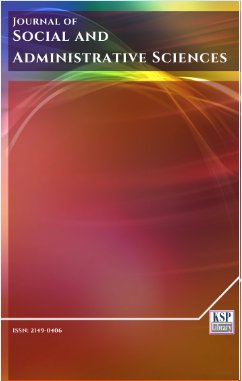Change Pressure on Organizational Commitment and Identification: Knowledge and Decision-making Competencies in Government Units
Abstract
Abstract. Staffs in government units may encounter problems of pressure when facing dramatic organizational changes. In an interesting context of administrative merge of Kaohsiung city and county, we examined the influences of change pressure on post-merger organizational identification and commitment. We further developed and investigated the detailed relationships from competence perspective, which emphasizes the importance of knowledge processing and decision making capabilities. Results followed. First, the hypothesized negative impact of change pressure on organizational identification was not supported. Second, change pressure has a significant negative influence on commitment. Third, identification influences on commitment positively. Fourth, the positive moderation role of knowledge capability in the relationship between pressure and identification was not supported. Fifth, the positive moderation role of knowledge capability in the relationship between change pressure and commitment was supported. Sixth, the positive moderation role of decision-making capability in the relationship between pressure and identification was not supported. Seventh, the positive moderation role of decision-making capability in the relationship between pressure and commitment was supported.
Keywords. Change pressure, Commitment, Identification, Knowledge competence, Decision-making competence, Government units.
JEL. M10.
Keywords
References
Aidemark, J. (2010). A multi-dimensional knowledge management systems planning approach, Journal of Information & Knowledge Management, 9(3), 291-302. doi. 10.1142/S0219649210002681
Ashforth, B.E., & Mael, F. (1989). Social identity theory and the organization, Academy of Management Review, 14(1) 20-39.
Bandura, A. (1986). Social Foundations of Thought and Action: A Social Cognitive Theory. Englewood Cliffs, NJ: Prentice-Hall.
Coch, L., & French J.R.P. (1948). Overcoming resistance to change, Human Relations, 1(4), 512-532. doi. 10.1177/001872674800100408
Constant, D., Kiesler, S., & Sproull, L. (1994). What's mine is ours or is it? A study of attitudes about information sharing, Information Systems Research, 5(4), 400-421. doi. 10.1287/isre.5.4.400
Constant, D., Sproull, L., & Kiesler, S. (1996). The kindness of strangers: The usefulness of electronic weak ties for technical advice, Organization Science, 7(2), 119-135. doi. 10.1287/orsc.7.2.119
Hansen, M.T., Lovas, B., & Mors, M.L. (2005). Knowledge sharing in organizations: Multiple phases, multiple networks, Academy of Management Journal, 48(5), 776-793. doi. 10.5465/AMJ.2005.18803922
Hansen, M.T., Mors, M.L., Løvås, B. (2005). Knowledge sharing in organizations: Multiple networks, multiple phases, Academy of Management Journal, 48(5), 776–793. doi. 10.5465/AMJ.2005.18803922
Hogg, M.A., & Terry, D.J. (2000). Social identity and self-categorization processes in organizational contexts, The Academy of Management Review, 25(1), 121-140.
Jantunen, A. (2005). Knowledge-processing capabilities and innovative performance: An empirical study, European Journal of Innovation Management, 8(3), 336-349. doi. 10.1108/14601060510610199
Kankanhalli, A., Tan, B.C.Y., & Wei, K.-K. (2005). Contributing Knowledge to Electronic Repositories: An Empirical Investigation, Management Information Systems Quarterly, 29(1), 1-20.
Lankau, M.J., Carlson, D.S., & Nielson, T.R. (2006), The mediating influence of role stressors in the relationship between mentoring and job attitudes, Journal of Vocational Behavior, 68(2), 308-322. doi. 10.1016/j.jvb.2005.06.001
Mann, L., Radford, M., Burnett, P., Ford, S., Bond, M., Leung, K., Nakamura, H., Vaughan, G., Yang, K.-S. (1998), Cross-cultural Differences in Self-reported Decision-making Style and Confidence, International Journal of Psychology, 33(5), 325-335. doi. 10.1080/002075998400213
McCann, M. (1994). Rights at Work: Pay Equity Reform and the Politics of Legal Mobilization. Chicago, IL: University of Chicago Press.
Meyer, J.P., Allen, N.J., & Smith, C.A. (1993). Commitment to organizational and occupations: Externsion and test of a three-component conceptualization. Journal of Applied Psychology, 78(4), 538-551. doi. 10.1037/0021-9010.78.4.538
Mowday, R T, Porter, L W., & Steers, R.M. (1982). Employee-Organization Linkages, The Psychology of Commitment, Absenteeism, and Turnover, Elsevier.
OReilly, C.A. & Chatman, J.A. (1986). Organizational commitment and psychological attachment: The effects of compliance, identification and internalization on prosocial behavior. Journal of Applied Psychology, 71(3), 492-499.
Paulhus, D.L. (1991). Measurement and control of response bias. in J.P. Robinson, P.R. Shaver & L.S. Wrightsman (Eds.), Measures of personality and social psychological attitudes (pp. 17-59). San Diego, CA: Academic Press.
Peterson, D.K. (2003). The relationship between ethical pressure, relativistic moral beliefs and organizational commitment, Journal of Managerial Psychology, 18(6), 557-572. doi. 10.1108/02683940310494386
Podsakoff, P.M., MacKenzie, S.B., Lee, J.Y., & Podsakoff, N.P. (2003). Common method biases in behavioral research: A critical review of the literature and recommended remedies. Journal of Applied Psychology, 88(5), 879-903. doi. 10.1037/0021-9010.88.5.879
Porter, L.W., Steers, R.M., Mowday, R.T., & Boulian, P.V. (1974). Organizational commitment, job satisfaction and turnover among psychiatric technicians, Journal of Appplied Psychology, 59(5), 603-609. doi. 10.1037/h0037335
Shaver, P.R., & Wrightsman, L.S. (1991). Criteria for scala selection and evaluation, in J.P. Robinson, P.R. Shaver, & L.S. Wrightsman, (Eds.), Measures of Personality and Social Psychological Attitudes: (pp.17-59), New York, NY: Academic Press.
Simon, H.A. (1979). Rational decision making in business organizations, The American Economic Review, 69(4), 493-513.
Simon, H.A., Dantzig, G.B., Hogarth, R., Plott, C.R., Raiffa, H., Schelling, T.C., Shepsle, K.A., Thaler, R., Tversky A., & Winter, S. (1987). Decision making and problem solving, Interfaces, 17(5), 11-31. doi. 10.1287/inte.17.5.11
Sims, R.L., Kroeck, K.G. (1994), The influence of ethical fit on employee satisfaction, commitment and turnover, Journal of Business Ethics, 13(12), 939-947. doi. 10.1007/BF00881663
Stone, E.F. (1978). Research Methods in Organizational Behavior, Goodyear, Santa Monica, CA.
van Kniperberg, D., van Knippenberg, B., Monden, L., & de Lima, F. (2002). Organizational identification after a merger: A social identity perspective, British Journal of Social Psychology, 41(2), 233-252. doi. 10.1348/014466602760060228
Vakola, M., & Nikolaou, I. (2005). Attitudes towards organizational change: What is the role of employees’ stress and commitment?, Employee Relations, 27(2), 160-174, doi: 10.1108/01425450510572685
Wasti, S. (2005). Commitment profiles: Combinations of organizational commitment forms and job outcomes. Journal of Vocational Behavior, 67(2), 290–308. doi. 10.1016/j.jvb.2004.07.002
Watson, D., Clark, L.A., & Tellgen, A. (1988). Development and validation of brief measures of positive and negative affect: The PANAS scales. Journal of Personality andSocial Psychology, 54(6), 1063-1070. doi. 10.1037/0022-3514.54.6.1063
Zack, M.H. (1999). Managing codified knowledge, Sloan Management Review, 40(4), 45-58.
DOI: http://dx.doi.org/10.1453/jsas.v4i1.1244
Refbacks
- There are currently no refbacks.
....................................................................................................................................................................................................................................................................................................................................... Journal of Social and Administrative Sciences - J. Adm. Soc. Sci. - JSAS - www.kspjournals.org
ISSN: 2149-0406
Editor: editor-jsas@kspjournals.org Secretarial: secretarial@kspjournals.org Istanbul - Turkey.
Copyright © KSP Library




